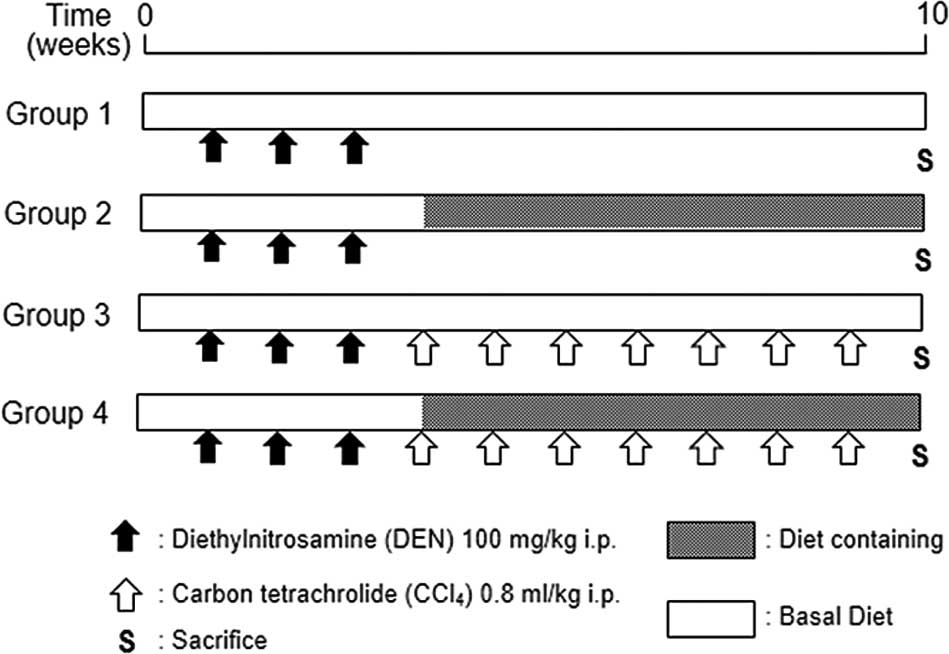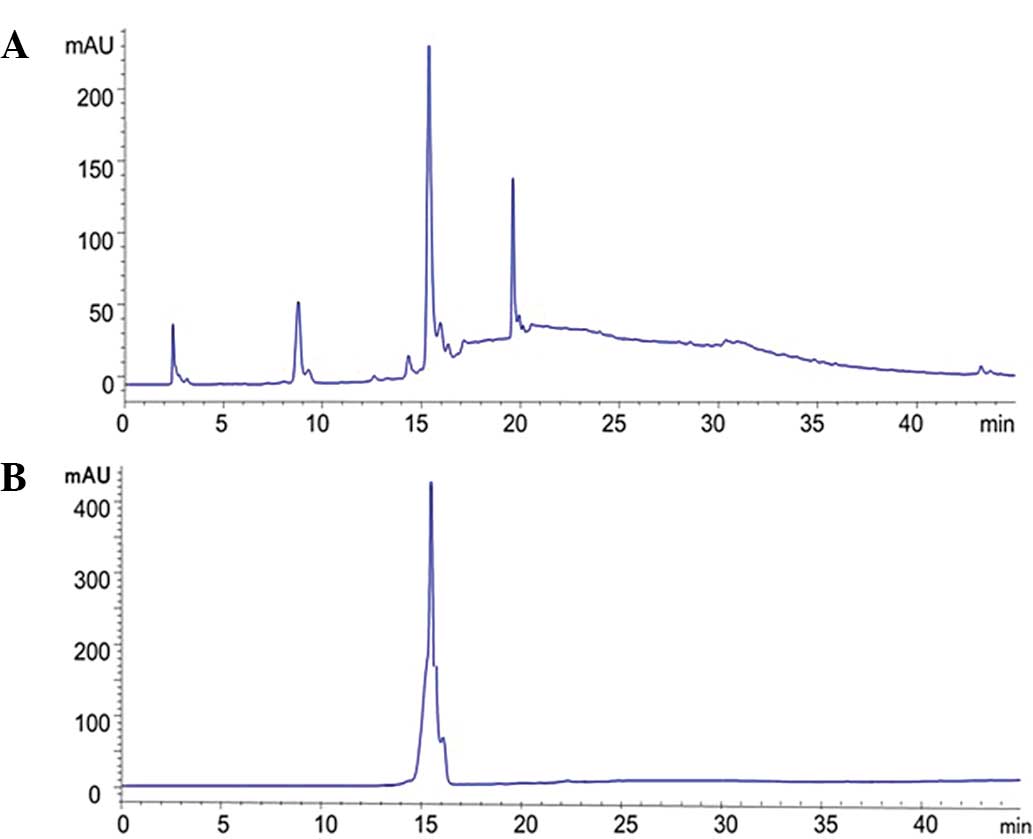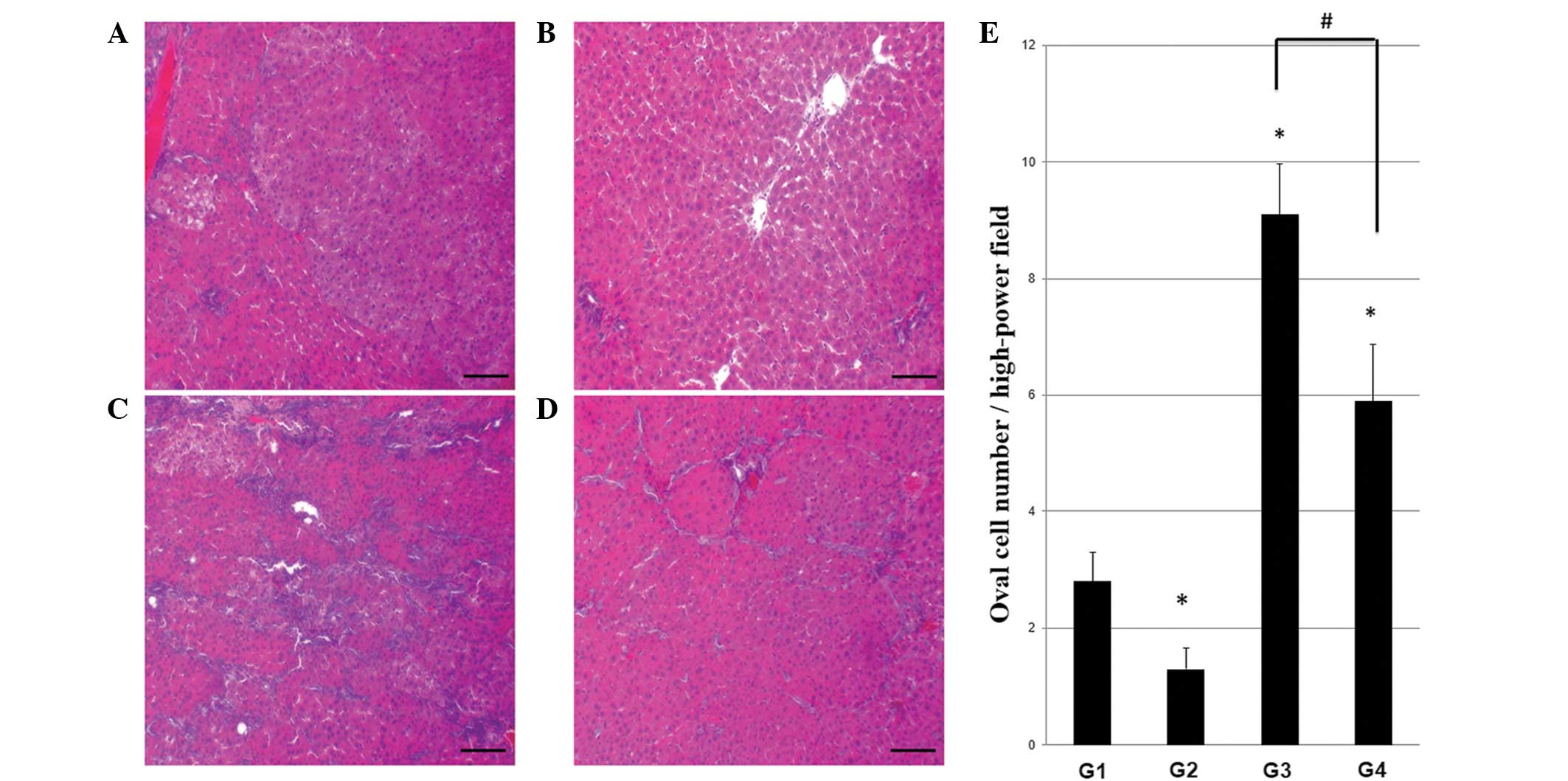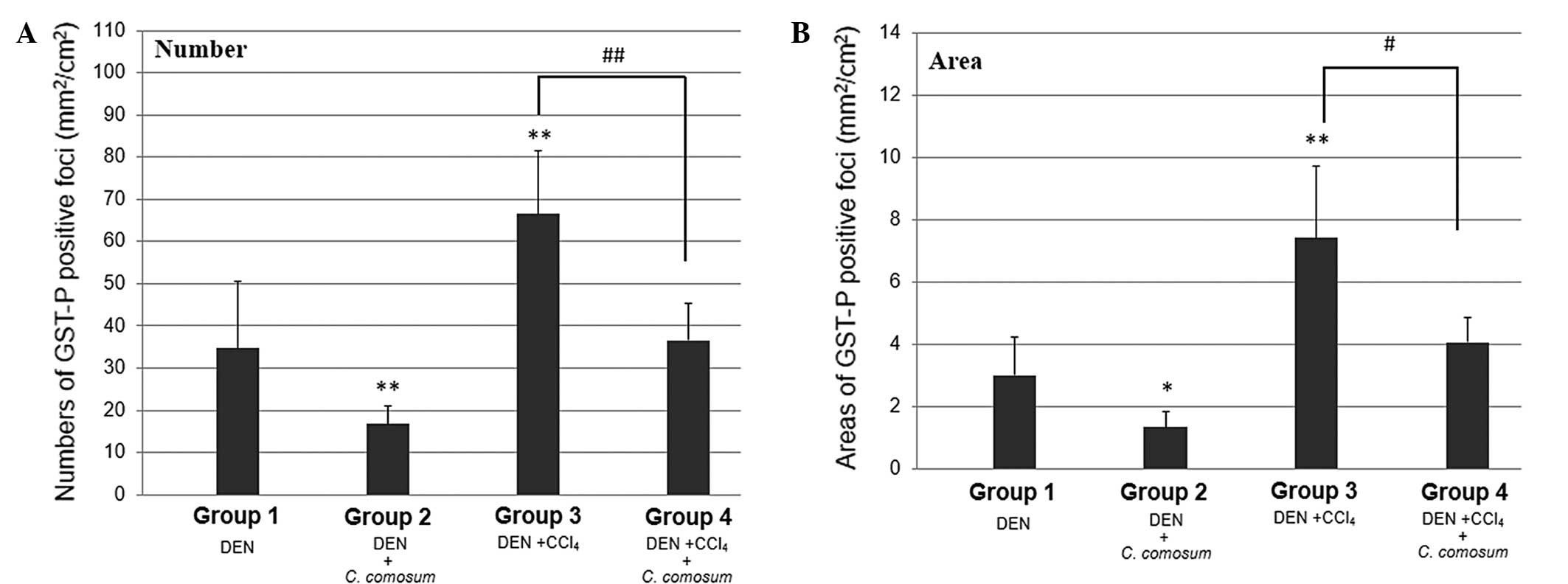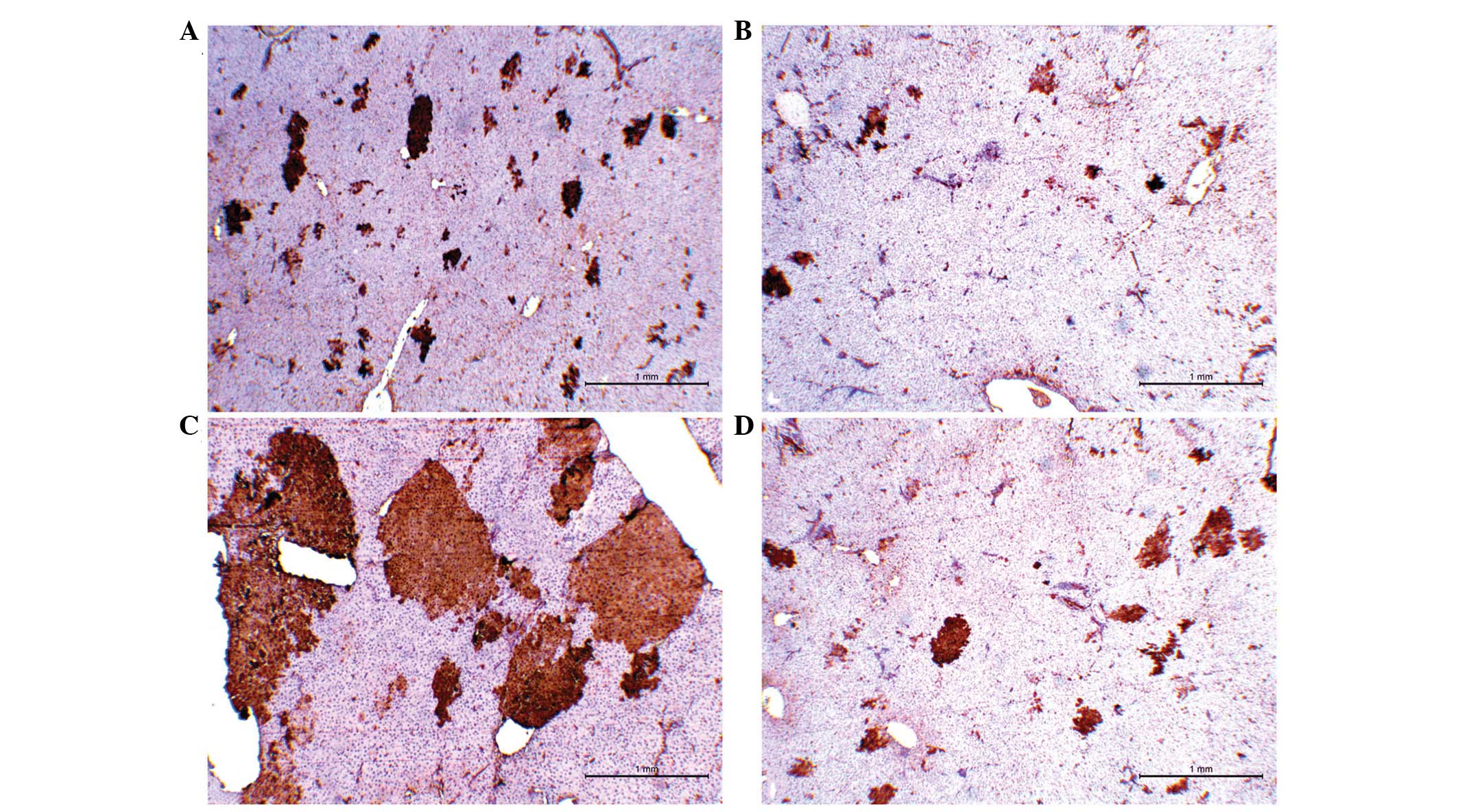|
1
|
Farazi PA and DePinho RA: Hepatocellular
carcinoma pathogenesis: from genes to environment. Nat Rev Cancer.
6:674–687. 2006. View
Article : Google Scholar : PubMed/NCBI
|
|
2
|
Anwar WA, Khaled HM, Amra HA, et al:
Changing pattern of hepatocellular carcinoma (HCC) and its risk
factors in Egypt: possibilities for prevention. Mutat Res.
659:176–184. 2008. View Article : Google Scholar : PubMed/NCBI
|
|
3
|
Stagos D, Amoutzias GD, Matakos A, Spyrou
A, Tsatsakis AM and Kouretas D: Chemoprevention of liver cancer by
plant polyphenols. Food Chem Toxicol. 50:2155–2170. 2012.
View Article : Google Scholar : PubMed/NCBI
|
|
4
|
Ghazanfar SA: Handbook of Arabian
medicinal plants. CRC Press; Boca Raton: pp. 1731994
|
|
5
|
Liu X, Zakaria MN, Islam MW, et al:
Anti-inflammatory and anti-ulcer activity of Calligonum
comosum in rats. Fitoterapia. 72:487–491. 2001. View Article : Google Scholar : PubMed/NCBI
|
|
6
|
El-Hawary Z and Kholief T: Biochemical
studies on some hypoglycemic agents (II) effect of Calligonum
comosum extract. Arch Pharmacal Res. 13:113–116. 1990.
View Article : Google Scholar
|
|
7
|
Badria FA, Ameen M and Akl MR: Evaluation
of cytotoxic compounds from Calligonum comosum L. growing in
Egypt. Z Naturforsch C. 62:656–660. 2007. View Article : Google Scholar : PubMed/NCBI
|
|
8
|
Abdel-Sattar EA, Mouneir SM, Asaad GF and
Abdallah HM: Protective effect of Calligonum comosum on
haloperidol-induced oxidative stress in rat. Toxicol Ind Health.
30:147–153. 2014. View Article : Google Scholar : PubMed/NCBI
|
|
9
|
Singleton V and Rossi J: Colorimetry of
total phenolics with phosphomolybdic-phosphotungstic acid reagents.
Am J Enol Vitic. 16:144–153. 1965.
|
|
10
|
Lamaison JL, Petitjean-Freytet C and
Carnat A: Rosmarinic acid, total hydroxycinnamic derivatives and
antioxidant activity of Apiaceae, Borraginaceae and Lamiceae
medicinals. Ann Pharm Fr. 48:103–108. 1990.(In French). PubMed/NCBI
|
|
11
|
Braca A, De Tommasi N, Di Bari L, Pizza C,
Politi M and Morelli I: Antioxidant principles from Bauhinia
tarapotensis. J Nat Prod. 64:892–895. 2001. View Article : Google Scholar : PubMed/NCBI
|
|
12
|
Nuutila A, Kammiovirta K and
Oksman-Caldentey K.M: Comparison of methods for the hydrolysis of
flavonoids and phenolic acids from onion and spinach for HPLC
analysis. Food Chemistry. 76:519–525. 2002. View Article : Google Scholar
|
|
13
|
Indian National Science Academy New Delhi,
. Guidelines for Care and Use of Animals in Scientific Research.
http://icmr.nic.in/bioethics/INSA_Guidelines.pdfAccessed.
October 11–2012
|
|
14
|
Puatanachokchai R, Morimura K, Wanibuchi
H, et al: Alpha-benzene hexachloride exerts hormesis in
preneoplastic lesion formation of rat hepatocarcinogenesis with the
possible role for hepatic detoxifying enzymes. Cancer Lett.
240:102–113. 2006. View Article : Google Scholar : PubMed/NCBI
|
|
15
|
Abdo W, Hirata A, Sakai H, El-Sawak A,
Nikami H and Yanai T: Combined effects of organochlorine pesticides
heptachlor and hexachlorobenzene on the promotion stage of
hepatocarcinogenesis in rats. Food Chem Toxicol. 55:578–585. 2013.
View Article : Google Scholar : PubMed/NCBI
|
|
16
|
Sakai H, Tsukamoto T, Yamamoto M, et al:
Distinction of carcinogens from mutagens by induction of liver cell
foci in a model for detection of initiation activity. Cancer Lett.
188:33–38. 2002. View Article : Google Scholar : PubMed/NCBI
|
|
17
|
Grisham JW and Thorgeirsson SS: Liver stem
cellsStem cells. Potten CS: Academic Press; London: pp. 233–282.
1997
|
|
18
|
Imai K, Yamamoto M, Tanaka H, et al: Low
selection of preneoplastic hepatocytes after treatment with the
2-acetylaminofluorene diet-partial hepatectomy regimen in the liver
of hepatocarcinogenesis-resistant DRH strain rats. Oncol Rep.
17:55–60. 2007.PubMed/NCBI
|
|
19
|
Ahn HY, Hadizadeh KR, Seul C, Yun YP,
Vetter H and Sachinidis A: Epigallocathechin-3 gallate selectively
inhibits the PDGF-BB-induced intracellular signaling transduction
pathway in vascular smooth muscle cells and inhibits transformation
of sis-transfected NIH 3T3 fibroblasts and human glioblastoma cells
(A172). Mol Biol Cell. 10:1093–1104. 1999. View Article : Google Scholar : PubMed/NCBI
|
|
20
|
Lee YH, Kwak J, Choi HK, et al: EGCG
suppresses prostate cancer cell growth modulating acetylation of
androgen receptor by anti-histone acetyltransferase activity. Int J
Mol Med. 30:69–74. 2012.PubMed/NCBI
|
|
21
|
Alshatwi AA: Catechin hydrate suppresses
MCF-7 proliferation through TP53/Caspase-mediated apoptosis. J Exp
Clin Cancer Res. 29:1672010. View Article : Google Scholar : PubMed/NCBI
|
|
22
|
Zhong Z, Dong Z, Yang L, Chen X and Gong
Z: Inhibition of proliferation of human lung cancer cells by green
tea catechins is mediated by upregulation of let-7. Exp Ther Med.
4:267–272. 2012.PubMed/NCBI
|
|
23
|
Demeule M, Michaud-Levesque J, Annabi B,
et al: Green tea catechins as novel antitumor and antiangiogenic
compounds. Curr Med Chem Anticancer Agents. 2:441–463. 2002.
View Article : Google Scholar : PubMed/NCBI
|
|
24
|
Cholbi MR, Paya M and Alcaraz MJ:
Inhibitory effects of phenolic compounds on CCl4-induced microsomal
lipid peroxidation. Experientia. 47:195–199. 1991. View Article : Google Scholar : PubMed/NCBI
|
|
25
|
Nakamuta M, Higashi N, Kohjima M,
Fukushima M, et al: Epigallocatechin-3-gallate, a polyphenol
component of green tea, suppresses both collagen production and
collagenase activity in hepatic stellate cells. Int J Mol Med.
16:677–681. 2005.PubMed/NCBI
|
|
26
|
Shimoda R, Nagashima M, Sakamoto M, et al:
Increased formation of oxidative DNA damage,
8-hydroxydeoxyguanosine, in human livers with chronic hepatitis.
Cancer Res. 54:3171–3172. 1994.PubMed/NCBI
|
|
27
|
McClain CJ, Hill DB, Song Z, Deaciuc I and
Barve S: Monocyte activation in alcoholic liver disease. Alcohol.
27:53–61. 2002. View Article : Google Scholar : PubMed/NCBI
|















